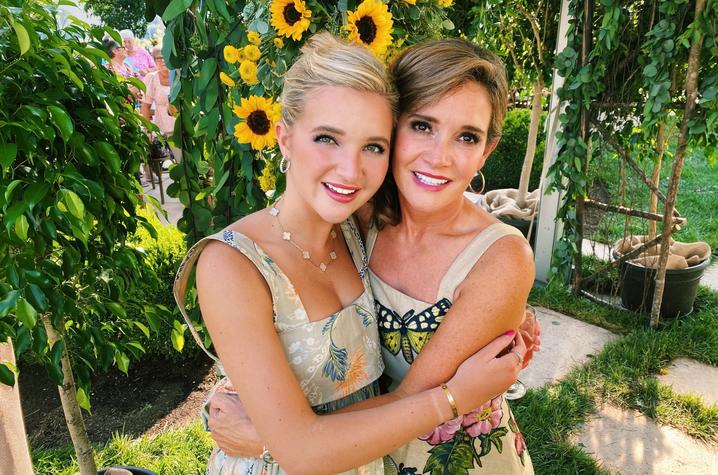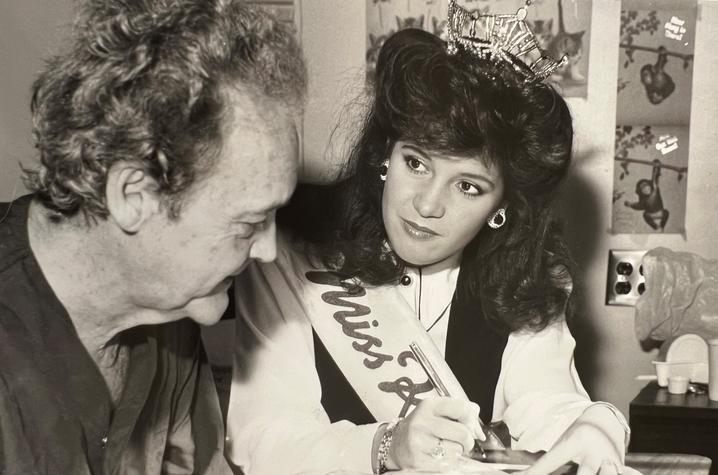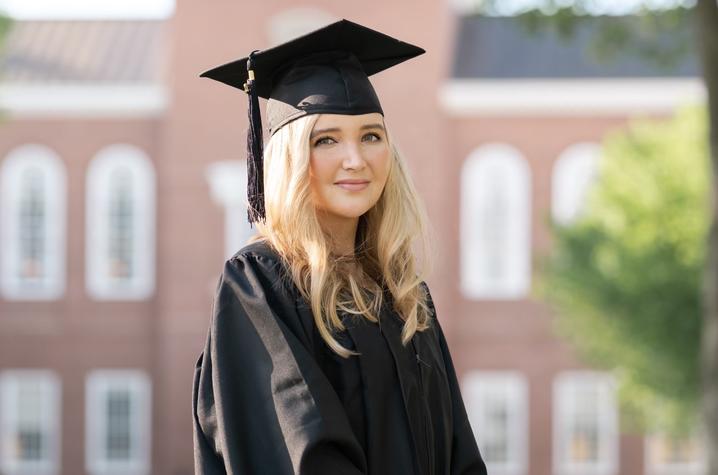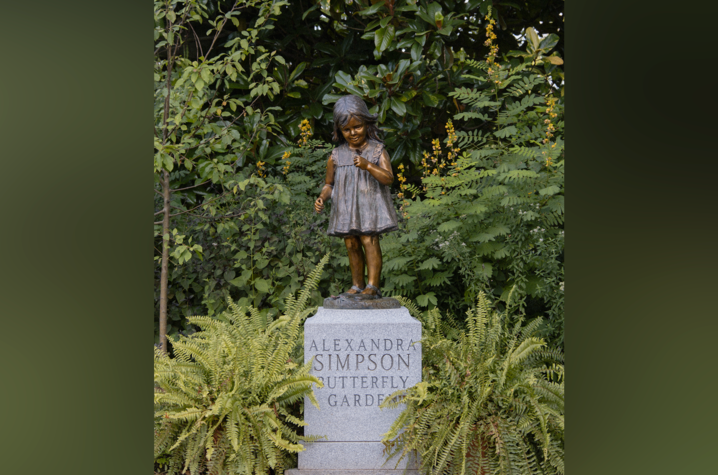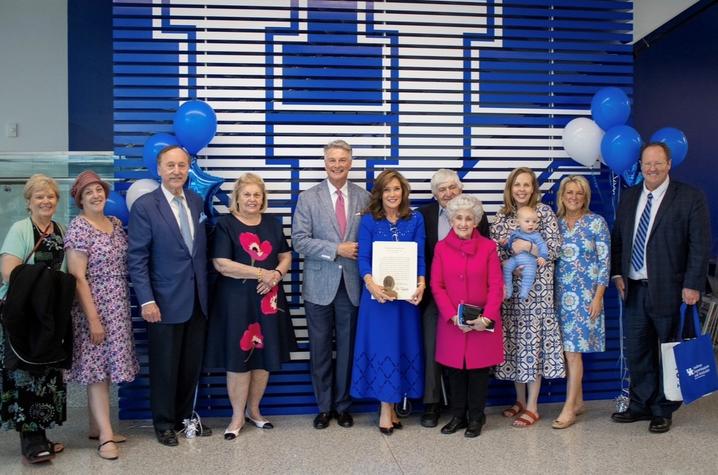UK alum shares her story of love, loss and legacy
LEXINGTON, Ky. (Oct. 22, 2024) — The article below is featured in the Fall 2024 edition of Kentucky Alumni magazine.
****
Forever Rainbows & Butterflies
Descending from her polar white SUV, Melanie Glasscock Simpson-Conley flashes her signature welcoming smile. The gauzy hem of her sundress flaps in a tepid breeze that offers little relief from the early August morning’s unusually oppressive heat.
A quartet of joggers pass nearby, their sinews drenched by rivulets of perspiration. The previous evening’s tempest — coupled with the rapidly rising temperature — has left the air thick, suffocating with dampness.
Simpson-Conley arrives at The Arboretum, State Botanical Garden of Kentucky, to discuss her daughter, Alexandra, and the extraordinary memorial gift that bears her name. As she walks the pebble-covered path past the Oatts Visitors Center, she relates precious memories of her only child. She intermittently describes her daughter’s characteristics in the present tense, infusing the conversation with a poignant sense of vitality.
She vividly remembers the diminutive Alexandra — Alex, for short — nestled in a booster seat in the rear of the family car, perusing flip books about butterflies and reciting facts about monarchs and blue morphos. She recalls how five or six of the gossamer-winged creatures would often alight upon Alex’s arms during their visits to The Arboretum and the intoxicating joy they both felt as a kaleidoscope flitted near.
Simpson-Conley’s eyes begin to glisten; her voice gets audibly higher as she delves into the endless string of bittersweet memories about her life with Alex. “I always cry,” she gently sighs. She
pauses and gazes skyward. A rainbow unexpectedly arcs gracefully over The Arboretum, seemingly terminating amid her destination. Turning, she points to the muted hues overhead and assures,
“It’s going to be all right.”
Thirty-five years have passed since Kentuckians were first introduced to Simpson-Conley during her coronation as Miss Kentucky 1989. Then known as Melanie Glasscock, she used her newfound platform to discuss topics important to her, including drug dependency and the myriad of challenges faced by individuals with disabilities. After passing the crown to future coworker Nancy Cox the following year, the Leitchfield, Kentucky, native returned to the UK College of Communication and Information to complete her journalism degree. The Miss Kentucky scholarship allowed the girl who had once sold chicken eggs from the family farm to pay for twirling lessons to graduate debt-free in 1992.
She parleyed her education and celebrity into broadcasting. Swiftly rising to become one of Central Kentucky’s most recognizable and beloved journalists, she made her mark at WKYT-27 and WLEX-18 over a distinguished decade. WKYT’s then-News Director John Bobel once said of the popular reporter: “She has a great presence…There’s an intangible quality that we’re looking for — you don’t know it until you see it in a person. And Melanie’s got it.” High-profile and lucrative offers came from larger news markets like Cincinnati and Raleigh, but she shares her heart has always been in the Bluegrass.
“Honestly, I never had that desire to leave,” Simpson-Conley says. “I had put down my roots here when I went to college, and I love Lexington.”
Following the birth of Alex in 1999, Simpson-Conley stepped away from her camera and microphone to focus on her family. She reeled when her husband of 13 years, William “Billy” Simpson, succumbed to cancer in 2008. His death created a void at the helm of KV Oil and Gas, compelling her to step into the roles of owner and president. Despite lacking a background in business or drilling, the former news anchor embraced the challenge, mastering the intricacies of the industry through hands-on experience and determination.
Simpson-Conley acknowledges that she inevitably made missteps along the way but credits those closest to her for guiding her early decisions and helping her company thrive. Resolute to lead her company with integrity, she quickly learned to balance business and single parenthood.
Five years later, Alex received a devastating diagnosis.
Simpson-Conley smooths her vibrant canary-hued skirt to sit on a weathered wooden bench within the pollinators section of The Arboretum — a fitting spot to discuss her daughter. Signs demarcate the area as “Alexandra Simpson’s Butterfly Garden.” The sweet aroma of nearby hydrangeas and Joe Pye blossoms saturates the air like a delicate perfume. She smiles as she surveys the area filled with plants and flowers, pointing out the abundance of rainbow-like color before pausing, gathering her thoughts, and attempting to articulate the essence of who Alex was.
“She was a fireball,” exclaims Simpson-Conley of her daughter, who received her first cancer diagnosis at age 13. “And persistent! She didn’t take ‘no’ for an answer. And that was not just with us — with adults, with other children, with her doctors — she needed you to explain why. She needed you to explain why ‘no’ was the only option. She thought there always had to be a way.”
Alex developed a condition known as CIC-DUX4 sarcoma. A rare and aggressive cancer akin to the more familiar Ewing’s sarcoma, CIC-DUX4 affects fewer than 100 children and young adults in the U.S. annually. The prognosis for the metastatic disease is not encouraging, but Alex beat the odds and not only survived but flourished during the next decade.
“Over 10 years, she was diagnosed three times — at 13, then it came back at 14, and again at 21. And during that time, while it’s tragic to say that a child has gone through that, it gives you a different perspective on life,” says Simpson-Conley. “I have to be honest. You hear things like that (Tim McGraw) song ‘Live Like You Were Dying,’ and it sounds cliché, but when you have a child that goes through this, you do live that way and truly enjoy every day.”
Simpson-Conley says that she relied on family and friends — including the doctors and nurses at UK’s Kentucky Children’s Hospital, whom she now considers both — to help provide Alex with the best life possible in the time they had. A keen photographer with a boundless curiosity for other cultures, Alex’s sense of adventure and love for nature took the mother-daughter duo to six continents and 26 countries between visits with oncologists and other specialists.
“When she was going through chemotherapy, I’d let her plan the next trip — it was up to her,” explains Simpson-Conley. “She’d sit there on her computer with a legal pad and say, ‘Oh, I really want to go to Italy. And these are the things I really would like to see in a perfect world.’”
Together, they wrung every drop of life from their epic adventures, which included marveling at the Terracotta Warriors in China, scaling the Andes in Peru and swimming the Great Barrier Reef.
“I can remember, even in the water, in my mask — crying — looking at the beautiful colors that God had created in the reef, but also thinking ‘there’s my daughter going through cancer treatment, living, seeing this,’” says Simpson-Conley, incredulously. “Or when we climbed Machu Picchu, you know, she was so far ahead of me, which I was so grateful for because I had to sit down every now and then, but she’s just a little bald head buzzing up to the ruins. I was so happy to see her going for it.”
Simpson-Conley says she was informed that, because the cancer had come back for a second time, Alex’s remission would probably only be temporary, and that her tumors would become resistant to chemotherapy. She was painfully aware of the likelihood that her beloved daughter might not survive a third bout with CIC-DUX4. By the time the cancer returned in 2021, Alex had long since graduated from Lexington’s SCAPA-Lafayette High School and was beginning her senior year at Dartmouth College in Hanover, New Hampshire, majoring in French and psychology. Simpson-Conley moved north to be near Alex while she continued her studies and received treatment at Boston Children’s Hospital. Aside from two roommates, Alex informed none of her classmates of her medical condition.
“She never said, ‘Poor me.’ She never used ‘the cancer card,’” says Simpson-Conley. “She didn’t want it to put a damper on her senior class or for them to treat her differently.”
Simpson-Conley recounts how she would routinely drive her daughter at 4 a.m. from Hanover to Boston for chemotherapy or radiation treatments. Alex would either sleep or study during the tedious two-and-a-half hour treks and return to campus for midday classes.
“She was there in the afternoon. She was going to social functions, but she was tired, so there were times she would come and stay with me. The goal was to graduate, for her to walk across that stage.”
Alex completed her studies in June 2022. On the eve of her graduation, however, Alex’s dream of crossing the Dartmouth Green and being recognized as a cum laude graduate was nearly dashed.
The night prior, as she sat on the floor buckling her daughter’s shoes, Simpson-Conley recalls looking up; “She said, ‘Mom, I don’t want to freak you out,’ — this is her personality, right? — ‘I don’t want to freak you out, but I think I’m having a stroke.’”
Determined to avoid a scene, Alex refused to allow her mother to call an ambulance, insisting that she be driven by private car so that none of her classmates would notice.
“The E.R. doctors said, ‘We need to admit you,’ but Alex argued, ‘I’m not going to be admitted. This is my third rodeo with cancer. I’m going to walk across the stage tomorrow and get my diploma. I worked too hard. What’s going to change at this point?’ She was not crying; she was dealing with the cards she was dealt. They found that the cancer had spread — that’s what caused the stroke. But she walked across the stage. She had a cane, but she did it.”
More radiation treatments and steroids immediately followed.
Even with her health deteriorating, Alex was defiant about allowing death to come before she took one last trip — to Africa this time. In July 2022, cautioned by doctors and accompanied by their support system, Alex and her mother flew from the U.S. to Kenya. Weakened and swollen from the medicine, Alex refused to allow her condition to diminish her enthusiasm. She met elephants and caressed giraffes, surrendered to the rhythm of the local dances, and flew across the vast savannahs in a helicopter. The family soared above the Maasai Mara in a hot air balloon and witnessed hippopotamuses raging. Alex, with a camera seemingly as heavy as she was, captured hundreds of photos. Her mother now carries many of the memories with her on her phone.
“I was awake every night watching her breathe. I didn’t want — ,” Simpson-Conley remembers, her voice cracking slightly. “I didn’t want to lose her on this trip. Of course, you never want to lose your children, but you kind of want those things, you know, in your own time and on your own terms. We came home from Africa the first week of August, and then we lost her on the 27th.”
In her will, Alex made provisions for causes she wanted to support through the Alexandra Hudson Simpson Foundation — each of which meant something to her during her brief 22 years.
Among Alex’s chief wishes was a new MRI machine for KCH, dedicated to young patients so that they need not share the machine with adults. It was an idea that germinated while receiving specialized treatment at other world-class hospitals across the U.S.; as the family witnessed how these child-forward hospitals operated, they asked how the innovations could be implemented at UK. This also led to Alex funding a music therapy program at KCH.
The family’s close association with KCH was also the impetus for their refurbishing and naming The Arboretum’s existing pollinator garden in Alex’s honor. It was the family’s way of giving back to the place that brought Alex so much joy as a child. Complete with rose mallow hibiscus and black-eyed Susans, Chartreuse on the Loose Catmint and black and blue sage, the garden is a haven for pollinators.
“The Butterfly Garden was established to demonstrate plantings that provide nourishment and habitat for pollinators,” explains Scott Smith, acting director of The Arboretum and dean emeritus of UK’s Martin-Gatton College of Agriculture, Food and Environment, which oversees operation of The Arboretum. The blossoms and the butterflies highlight the critical ecological role of essential but often endangered pollinators, Smith says. “This spot, in particular, offers a diverse mix of plants — and pollinators — to enjoy,” he says. “We’re grateful to the Simpsons for their support of this special spot at The Arboretum.”
In April, Alex was recognized with UK’s highest humanitarian award, the Algernon Sydney Sullivan Citizen Award, in recognition of her “spirit of love for and helpfulness to other men and women.”
Alex also supported such causes as Lexington Children’s Theatre, The Lexington School and Central Christian Church, among others.
Beyond the monetary gifts that she left, Alex also entrusted a part of herself to be studied in the hopes of alleviating the suffering of others. Simpson-Conley says that by gifting her tumors to Boston’s Dana-Farber Cancer Institute for study and genetic mapping, Alex offers hope and a fighting chance to other children battling CIC-DUX4, ensuring her struggle serves a greater purpose in the fight against cancer.
In the two years since Alex’s death, with husband, Kentucky Supreme Court Justice for the 7th District Robert “Bob” Conely BE ’81 — whom she married shortly before Alex’s death — by her side, Simpson-Conley plays an active role in assuring that her daughter’s passion projects come to fruition and enriching the lives of others.
While, as in her pageant days, Simpson-Conley continues to support and advocate for multiple worthy causes, she says that KCH occupies a special place in her heart.
“Out of all the organizations, that’s where I lost her, so my heart sits there with them,” Simpson-Conley reveals. “They truly helped give her those seven years (between age 14 and 21), which gave me the gift of seven more years with her.”
As her husband divides his days adjudicating in Catlettsburg and Frankfort, Simpson-Conley continues to work as CEO of KV Oil and Gas, commuting to Lexington from the historic 200-year-old home the couple recently purchased in bucolic Bourbon County. Simpson-Conley plans to eventually move her business closer to her home and share more time with Bob and his adult children from his previous marriage to the late Melanie Stephens Conley, Brian Conley and Katie Conley-Morrison CI ’13.
Although she has largely been out of the spotlight for nearly a quarter-century, the public still remembers her. She reflects on her celebrity with a philosophical grace, expressing no regret about her decision to step away and embrace the roles of wife, mother and, now, pediatric health care advocate.
“Miss Kentucky and broadcasting were both lovely chapters in my life and incredibly fulfilling at those moments, but I hope my meaning for being on this earth is much deeper,” she thoughtfully explains. “I hope that through things like Alex’s gifts, our gifts to the community, and our involvement in nonprofits, we’re giving back and making the community a better place to live. I hope that our legacy is something that is giving and lasting long after we’re gone, like The Arboretum.”
As she strolls from the butterfly garden back to her vehicle, Simpson-Conley recounts the recent vacation she and her avid cyclist husband took to Canada. She shares how she talked to Alex’s spirit while riding a bike for those 50 miles and how she imagines her daughter would have playfully teased her for getting winded after mile 20. Her eye catches a tiny cabbage butterfly fluttering near the lush ground foliage. She looks to the azure sky. The rainbow has long dissipated, but she beams.
As the state’s flagship, land-grant institution, the University of Kentucky exists to advance the Commonwealth. We do that by preparing the next generation of leaders — placing students at the heart of everything we do — and transforming the lives of Kentuckians through education, research and creative work, service and health care. We pride ourselves on being a catalyst for breakthroughs and a force for healing, a place where ingenuity unfolds. It's all made possible by our people — visionaries, disruptors and pioneers — who make up 200 academic programs, a $476.5 million research and development enterprise and a world-class medical center, all on one campus.





